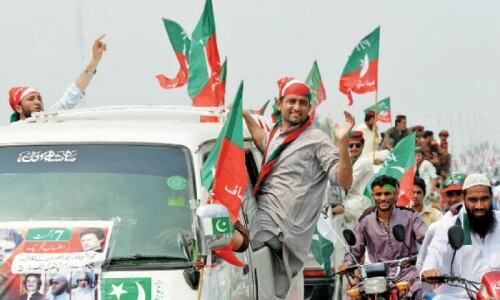ISLAMABAD, Jan 11: A US delegation of lawyers and law students from their National Lawyers Guild (NLG) at the end of their visit to Pakistan concluded here on Friday that anything short of restoration of November 2, 2007 judiciary would have long-term negative impacts on judicial independence and the rule of law in the country.
“The true battle being waged today is not between democracy and ‘terrorism’ rather it is a battle between advancing the values of democracy, rule of law and human rights on one hand and repression and autocratic rule on the other,” David Gespass, the eight-member delegation’s vice-president told reporters here at a local hotel.
The NLG is an affiliate of the International Association of Democratic Lawyers currently on a 10-day visit to Pakistan.
After interviewing 50 people from different political parties, lawyers, members of civil society, government officials, judges, students and journalists in Lahore, Karachi, Peshawar, Quetta and Islamabad, the delegation prepared a preliminary report noting severe structural and procedural problems in the pre-election climate.
Lack of an independent election commission and independent judiciary, it apprehended, is likely to make holding of free and fair elections impossible.
Besides the delay of scheduled elections on January 8 following the assassination of Benazir Bhutto is also in violation of the Constitution and therefore unlawful.
While concluding, Mr Gespass emphasised the role of free and independent media that was necessary to act as a check on military rule and on corruption in civilian administration.
It is possible that the election results may reasonably reflect the will of the voters in the light of President Pervez Musharraf’s extreme isolation, the report said, and appreciated that emergence of organisations like Free and Fair Elections Network (Fafen) provided some hope that in future Pakistan would move towards meeting these standards.
The NLG was also critical of the dual standards of the US towards Pakistan and asked it to encourage and promote restoration of all deposed judges, an independent media and free, fair and transparent elections to be held as scheduled.
It emphasised the US to change their policy away from support for military dictatorship and towards support of genuine democracy and rule of law in Pakistan.
About US interference in Pakistan’s internal affairs, David Gespass explained that his delegation was not representing any government policy but conceded that such intrusion were in violation of international norms and the law and that the US was often guilty of such breach. He also referred to Hugo Chavez, the president of Venezuela, who was thrown out of power through a military coup with US backing but had to be reinstated on strong public pressure.
The support of President Musharraf’s repressive government actually exacerbates instability and has inflamed anti-American sentiment throughout all layers of the Pakistani society, the report said.
Support for the democratic process, independent press and judiciary rather than unconditional support for an individual head of state, it suggested, would advance the interests of the Pakistani people in building a sustainable democracy while also assuaging American stability concerns.
The US administration has several effective policy options at its disposal from curtailing aid to Pakistan by subjecting it to audit or restricted to economic social development projects, it said.
Furthermore, aid could be conditioned on the restoration of the judiciary and holding a prompt, free and fair elections.
About meeting deposed Chief Justice Iftikhar Mohammad Chaudhry, Mr Gespass deplored that despite attempts the government did not respond to their request to allow meeting his team with Justice Iftikhar or detained president of the Supreme Court Bar Association (SCBA) Aitzaz Ahsan.
Muzzling of the media and widespread arrests of lawyers and political activists under ‘de facto’ martial law, made wide scale public protests extremely difficult, the report noted.













































Dear visitor, the comments section is undergoing an overhaul and will return soon.